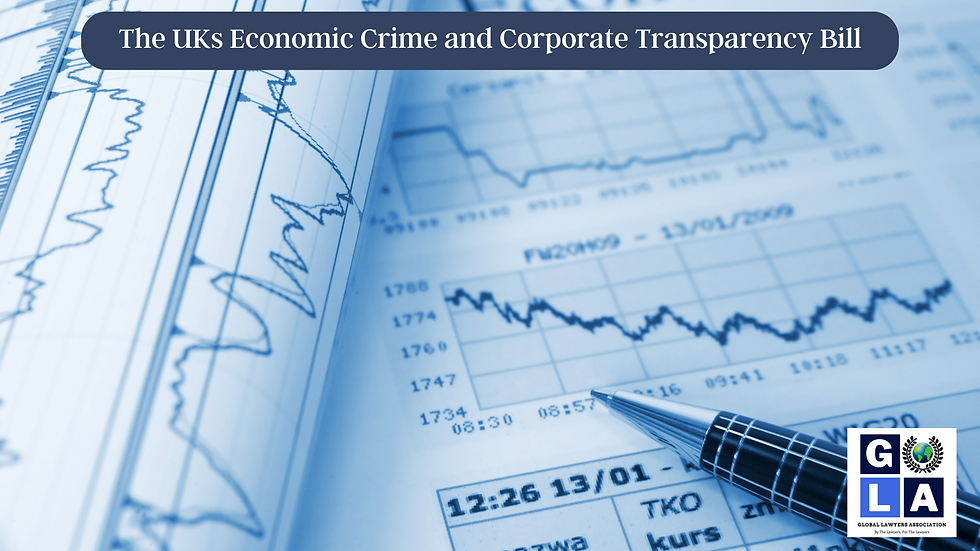
With an aim to clamp down corporate fraud, improve fraud prevention, protect victims and to hold organisations accountable for fraud offences committed by their employees, the UK government introduced the Economic Crime and Corporate Transparency Bill in September 2022. Since the Ukraine-Russia war, allegations have been raising in regard to economic crime committed by the rich class individuals in the UK. While, even now there exists provisions such as imposing fines and prosecuting of organizations for fraud offences, the government has certified that the same is not enough. To strengthen the powers and close legal loopholes, the UK government has brought into light the wide-ranging piece of legislation of about 250 pages, also known as the Economic Crime and Corporate Transparency Bill. The 250-paged legislation introduces a host of changes including expanded powers for regulators and law enforcement, as well as new registration and transparency requirements for businesses and limited partnerships.
In its title, the bill aims to make provision about economic crime and corporate transparency; to make further provision about companies, limited partnerships and other kinds of corporate entity, and to make provision about the registration of overseas entities. The bill is predicted to receive royal assent in the spring of 2023, and is built on the Economic Crime (Transparency and Enforcement) Act 2022, which received royal assent in March 2022.
The key aims of the Bill are as follows:
Deliver reforms to Companies House to expand its role and power
Introduce reforms to prevent the abuse of limited partnerships
Roll out identity verification measures for relevant stakeholders
Bring in additional powers to seize and recover suspected criminal crypto assets
Give businesses more confidence to share information to tackle money laundering and other types of economic crime
Introduce new intelligence gathering powers for law enforcement
Remove inconsequential burdens on business
Among the most significant reforms introduced under the bill is of compulsory identity verification procedures for all new and existing company directors, persons with significant control (PSCs) and agents who file information at Companies House. A Companies House is the executive agency of the government responsible for maintaining the register of companies, employing company registrars and for incorporating all forms of companies in the UK. The agency is currently tasked with storing information on corporate entities in the UK and its ability to query or flag that information is very limited. The introduced bill intends to change this role and help the Companies House actively flag suspicious activity or inaccurate data among corporations.
This will be achieved through the introduction of identity verification for all new and existing registered company directors, individuals with significant control, limited liability partnership (LLP) members and people delivering documents to the registrar. That will improve the accuracy and transparency of data while facilitating law enforcement investigations. Companies House will also receive new powers to check, remove or decline information submitted to, or already on, the companies register. Financial information on the register will also be improved so that it is more reliable and accurate while reflecting advancements in digital technology.
Moving on, the new bill will also modernise the law governing limited partnerships and tackle their misuse. The bill will increase transparency, make registration requirements more stringent, and oblige limited partnerships to maintain connection to the UK. New measures will even allow for deregistration of dissolved limited partnerships.
The Bill will also strengthen anti-money laundering powers and help facilitate better information sharing about suspected offences. In certain situations, businesses will be able to share information more easily for the purpose of preventing, investigating or detecting economic crime. The bill will provide the National Crime Agency’s Financial Intelligence Unit with an expanded ability to obtain information from businesses related to money laundering or terrorist financing. This will be achieved through the removal of the requirement for a pre-existing Suspicious Activity Report to have been submitted before an Information Order can be made.
In the end of September 2022, the British government announced fraud as the most common offence in the UK, accounting for 41% of all crime. Over 929 UK companies were involved in 89 cases of corruption and money laundering between 2000-2019, all of which, resulted in £137 billion in economic damage. With the introduction of the Economic Crime and Corporate Transparency Bill, the UK government intends to drive a cultural change with a focus to prevent fraud, and hold organisations accountable for offences through prosecutions.
#lawfirmstrategy#lawfirmmarketing#lawfirmmanagement#lawfirmgrowth#lawfirmleadership#legaltech#legalindustry#legal#legalmanager#legaldocument#legaldisruption#legalinnovation#legalknowledge#legalmarketing#legaleducation#legaladvice#legalcommunity#legalhelp#legalissues#legalawareness#legaldesign#legalblog#legalmatters#legalcounsel#legaldocuments#legalconsulting#legalai#legalcloud#lawtech#lawyers#lawpractice#lawupdates#laws#lawnews#lawenforcement#law
Follow Global Lawyers Association for more news and updated from International Legal Industry.
.png)
Comentários